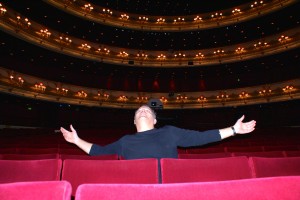
Martin Kušej in the Royal Opera in Covent Garden
With his Royal Opera House debut in Covent Garden, Austria’s star director Martin Kušej shows a new interpretation of Mozart’s opera “Idomeneo”: It is not the Gods, but the people, who decide the fate of Crete.
Martin Kušej stands outside the Royal Opera House, enjoying the warm autumn sun and his London debut. Austria’s star director looks up at the building, saying, “I will not complain, it is a beautiful, big house!” Kušej, who was born in Carinthia in the South of Austria, has had to get used to Anglo-American work conditions: “There is not much leeway, everything is really tightly calculated”. The director of the Residenztheater in Munich – where Mozart’s opera was first performed in 1781 – is not a pretentious guest: Kušej’s interpretation of the opera “Idomeneo” does not bring the house down. He just shakes up the foundation. This is quite different from his colleague Hans Neuenfels’ 2006 version in Berlin. Neuenfels presented the severed heads of several prophets on stage, among them the head of Mohammed. This “Idomeneo” was taken off the program prematurely. Mozart’s “Idomeneo” has only recently enjoyed great popularity. After its first premiere, the drama about a tyrannical father and his reform oriented son disappeared from the stage for a century. Now it is back. ROH opera director Kaspar Holten just put his own “Idomeneo” in Vienna on stage in October. Now it is Kušej’s turn. His production opens on November 3rd. In the last days of rehearsals the director sits quietly in the red velvet chairs of the opera and lets conductor Marc Minkowski put in final touches. The French conductor stops the Swedish guest star and soprano Malin Byström, who sings a passionate Elektra, and asks her to move 50 centimeters closer to the orchestra on her knees. Byström shows him that she considers this request absolutely unnecessary. Kušej, on the other hand, always reacts accommodatingly to Minkowski’s ideas. When the conductor turns around and searches for the director in the dark to get his permission to change details of the performance, Kušej usually calls out: “Yes, yes, that’s ok.” Sometimes, however, he puts his foot down. When Minkowski demands less red flags being waved wildly on stage because it disturbs the flow of the music, Kušej objects. He needs the demonstration of the people’s triumph: “In the end it is not the will of God, if Idomeneo spares his son.” Kušej sidesteps discussing the biblical question of whether or not a father should sacrifice his son on behalf of higher powers. When Idomeneo returns from the Trojan wars he does not negotiate his fate with Poseidon, the God of the seas. Instead, he meets Crete’s high priest, who informs him that his son has turned the people against him and let revolutionary ideas develop on the island. Kušej subtly changes the opera from a drama about the Gods and their subordinates to a politically charged statement about generational conflict, in which people are sovereign over their own fate. The people of Crete elect Idamante, the son, as their new ruler. The old tyrant Idomeneo lies dying while the people step over him into a better future… … maybe. At the end, bride and groom – the new king and his Ilia – stand speechless on a pile of bloody clothes, the leftovers of the civil war. This ghastly hill is covered with the sheer white bridal veil, but bloodstains appear quickly as the blood seeps through. It is not so easy to cover up the wounds of the past.


